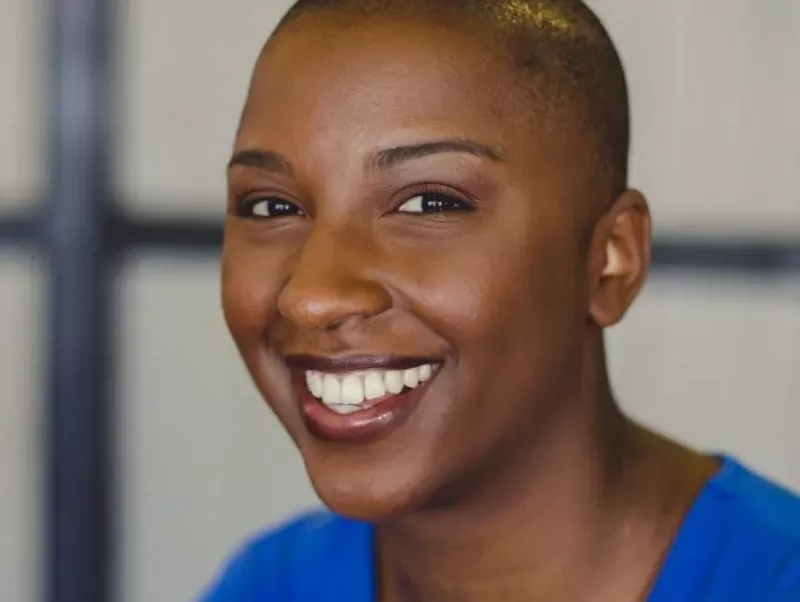A psychologist testified Amber Heard had borderline personality disorder during the Johnny Depp defamation trial.
Borderline personality disorder (BPD) is often stereotyped in the media as a condition that primarily affects white women.
Mental health advocate Ashley Jaye told Insider it was difficult to get a diagnosis as a Black woman.
Content warning: this article mentions suicide.
It wasn't until Ashley Jaye was hospitalized after an episode of self-harm in 2018 that she decided to seek out professional help.
Up until that point, she had numerous episodes of self-harm, suicide attempts, and periods of emotional dysregulation, but she said she hid many of her attempts from others in her life. But when Jaye started working with a therapist, her initial diagnosis—depression—didn't sit right with her.
"I had no depression symptoms, but also I felt just like emotionally dysregulated, and I didn't really know how to keep relationships or how to maintain them," Jaye told Insider. "It was always a lot of turmoil for me."
That's when she decided to do a little research online. After she was released from the hospital in 2018 and placed in required outpatient programs, she began to hear and learn more about borderline personality disorder and found that it better fit her symptoms.
"I said, you know, this actually fits me a lot better than just simply depression," Jaye, who is a mental health advocate and the creator of r/Blackmentalhealth on Reddit, told Insider.
Once Jaye spoke to her psychiatrist about potentially having BPD, the clinician admitted they'd already suspected that diagnosis. They told Jaye that they kept it as a secondary diagnosis because, as Jaye recalled, "a lot of insurances don't really cover services for BPD."
Jaye is now undergoing dialectical behavioral therapy, the only treatment for BPD, and said she is feeling better about managing her symptoms.

Heard speaks with a member of her legal team in court on April 14, 2022. A psychologist who conducted an evaluation of Heard testified the actress had borderline personality disorder during the defamation trial.SHAWN THEW/POOL/AFP via Getty Images
What is borderline personality disorder?
Borderline personality disorder (BPD) is a mental health condition characterized by extreme and frequent mood swings, poor self-image, and relationship problems, according to the American Psychiatric Association's guide to the Diagnostic and Statistical Manual.
The disorder has recently captured the public's attention due to Amber Heard and Johnny Depp's defamation trial. A psychologist hired by Depp's team testified that Heard has the condition, along with histrionic personality disorder.
The disorder affects about 2% of the population, and 75% of those diagnosed are women, according to the American Psychiatric Association (APA). People are typically affected in early adulthood.
Natalie Jones, a psychotherapist in California with expertise in personality disorders and Black women's mental health, told Insider that people with the condition may obsessively analyze and research the people they come in contact with. The trait crosses culture and gender lines, and reflects how people with BPD relate to others in their lives as well.
"There is a lack of boundaries and personal space," Jones said.
To be diagnosed, psychologists look for symptoms such as intense bouts of sadness and anxiety, risky behavior, paranoia, suicidal behavior, a pattern of unstable relationships, and an unhealthy self-image.
The condition runs in families, and is about three to four times more common among first-degree relatives of someone with the disorder. There are no FDA-approved drugs to treat BPD, but dialectical behavior therapy may help. The therapy helps people manage their thoughts and feelings, and develop healthy coping mechanisms.
"What's misunderstood about this condition and personality disorders in general is that people can't change," Jones said. "And what I've seen is quite the opposite."

Winona Ryder and Angelina Jolie in "Girl, Interrupted" (1999). The movie is a famous example of borderline personality disorder depicted in Hollywood.Columbia Pictures
BPD can be tough to diagnose.
BPD can be tough to diagnose in all races since mental health professionals are hesitant to diagnose it too early, Ashley Bryant, a Black trauma-informed clinical mental health counselor, told Insider.
Bryant said that while she might recognize symptoms of BPD in an adolescent patient, she waits until they are 18 years old before diagnosing them because, "anything under that [age] is kind of frowned upon because their brain is still developing."
In the meantime, she said young patients may be diagnosed with oppositional defiant disorder or disruptive mood dysregulation disorder.
Jaye said that as a child growing up in a religious household, she repressed her negative emotions and found that "any sort of talk of mental health was disregarded." In retrospect, she said as a teenager she experienced a lot of emotional dysregulation. "I never really knew how to express how I was feeling," Jaye said. "I always felt like my relationships were up and down constantly."
Misdiagnoses can contribute to BPD's relative rarity, Bryant said. Mental health professionals may diagnose people with depression, post-traumatic stress disorder, and anxiety, even if the person is presenting symptoms of BPD, because they have less familiarity with that diagnosis.
Fighting the stigma of the "angry Black woman."
A 2009 American Psychological Association study found that Black people with BPD experience greater affective intensity and emotional dysregulation, fewer self-harming behaviors, and more thoughts of interpersonal aggression than white people.
Oftentimes the multicultural aspects of a patient's background are overlooked, which might lead to a misdiagnosis if a clinician fails to notice specific symptoms that are less common to BPD, Bryant said.
Jaye said her symptoms, that were often aimed at herself and repressed, made it harder for doctors to diagnose her.
"Because I am a Black woman, and because I know that if I were to display anger out and publicly, my life could be at risk."
BPD is often stereotyped in pop culture as being a condition that primarily affects white women, showcased in movies like "Girl, Interrupted," "Silver Linings Playbook," "Fatal Attraction," and Harley Quinn in the Marvel universe.
Jaye said there needs to be a decoupling of BPD from being a white women's illness so that Black women can get the help they need sooner.
"A symptom of anxiety could be like irritability, for example, but a lot of people, if they see a Black woman super irritable, they just think, 'oh, she's the angry Black woman.' And I was like, no, she could be suffering from severe anxiety."
In Jones' experience, a symptom common among Black moms is a lack of boundaries between them and their kids. Black moms with BPD may "view their children as an extension of them" in an extreme way, she said. Hypersexuality, another common symptom of BPD due to patients' desire for intimacy and closeness, can also be more negatively perceived when Black women display it, Jones said.
Jaye said the stigma and risks of "acting out" as a Black woman can also hold people back from getting help.
"That's why I tend to be repressed about it and turn all of my blame inward and once I'm able to get home and shut myself in a room or closet, then that's when I have all my mood swings and all my emotions," Jaye said.
"Because we know that any sort of maladaptive behavior we show in public, we could probably die."




